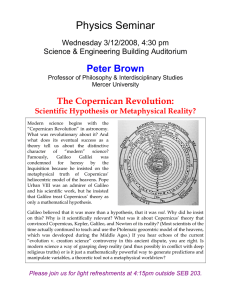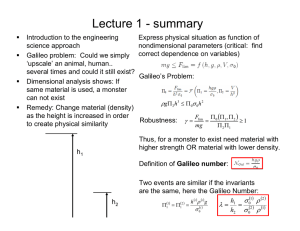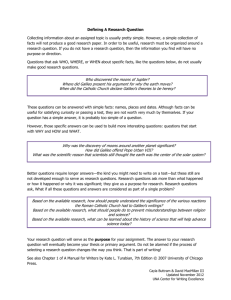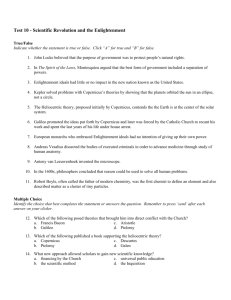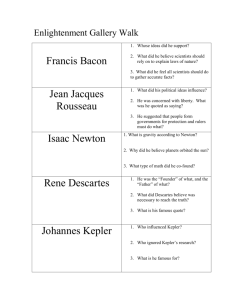Cliff Notes/ Reading Guide to Selections
advertisement
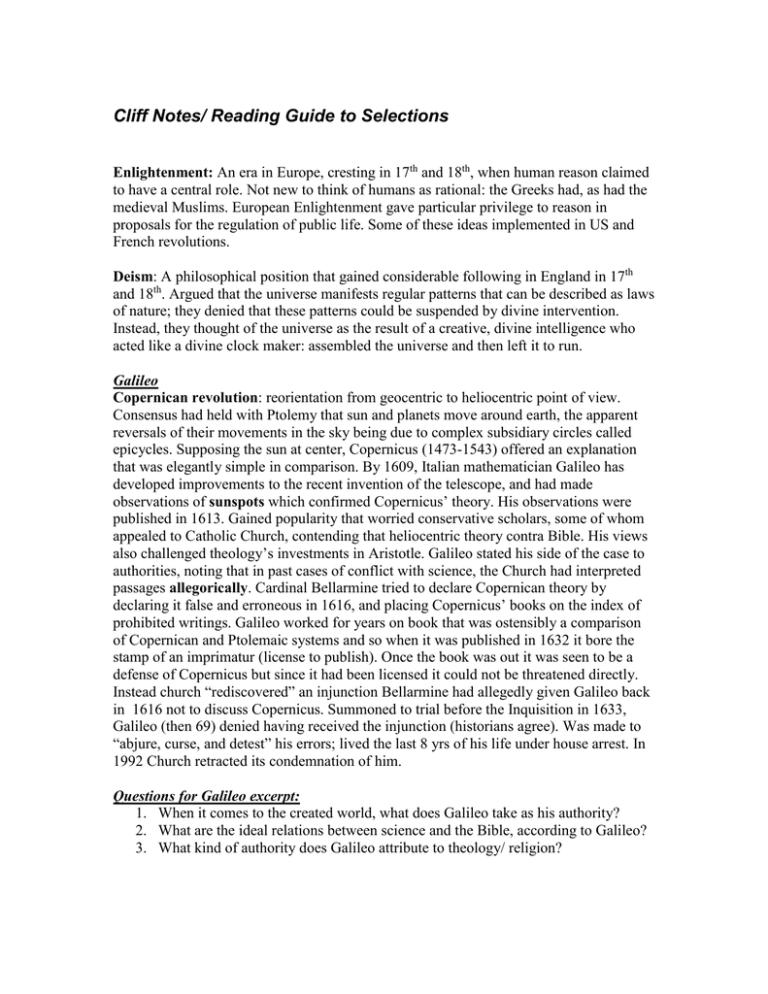
Cliff Notes/ Reading Guide to Selections Enlightenment: An era in Europe, cresting in 17th and 18th, when human reason claimed to have a central role. Not new to think of humans as rational: the Greeks had, as had the medieval Muslims. European Enlightenment gave particular privilege to reason in proposals for the regulation of public life. Some of these ideas implemented in US and French revolutions. Deism: A philosophical position that gained considerable following in England in 17th and 18th. Argued that the universe manifests regular patterns that can be described as laws of nature; they denied that these patterns could be suspended by divine intervention. Instead, they thought of the universe as the result of a creative, divine intelligence who acted like a divine clock maker: assembled the universe and then left it to run. Galileo Copernican revolution: reorientation from geocentric to heliocentric point of view. Consensus had held with Ptolemy that sun and planets move around earth, the apparent reversals of their movements in the sky being due to complex subsidiary circles called epicycles. Supposing the sun at center, Copernicus (1473-1543) offered an explanation that was elegantly simple in comparison. By 1609, Italian mathematician Galileo has developed improvements to the recent invention of the telescope, and had made observations of sunspots which confirmed Copernicus’ theory. His observations were published in 1613. Gained popularity that worried conservative scholars, some of whom appealed to Catholic Church, contending that heliocentric theory contra Bible. His views also challenged theology’s investments in Aristotle. Galileo stated his side of the case to authorities, noting that in past cases of conflict with science, the Church had interpreted passages allegorically. Cardinal Bellarmine tried to declare Copernican theory by declaring it false and erroneous in 1616, and placing Copernicus’ books on the index of prohibited writings. Galileo worked for years on book that was ostensibly a comparison of Copernican and Ptolemaic systems and so when it was published in 1632 it bore the stamp of an imprimatur (license to publish). Once the book was out it was seen to be a defense of Copernicus but since it had been licensed it could not be threatened directly. Instead church “rediscovered” an injunction Bellarmine had allegedly given Galileo back in 1616 not to discuss Copernicus. Summoned to trial before the Inquisition in 1633, Galileo (then 69) denied having received the injunction (historians agree). Was made to “abjure, curse, and detest” his errors; lived the last 8 yrs of his life under house arrest. In 1992 Church retracted its condemnation of him. Questions for Galileo excerpt: 1. When it comes to the created world, what does Galileo take as his authority? 2. What are the ideal relations between science and the Bible, according to Galileo? 3. What kind of authority does Galileo attribute to theology/ religion? Questions for Pascal excerpt: 1. When does Pascal think it is right for people to rely on authority? When does he think people should not rely on authority? 2. Explain how Pascal reconciles science and faith by talking of “reasons of the mind” and “reasons of the heart.” Questions for Locke excerpt: 1. Does Locke’s view that the mind is like white paper agree or disagree with Plato’s idea of the Forms? 2. When does Locke think we should be guided by reason? When by faith? 3. When the claims of reason are contradicted by what religious authorities say, which does Locke think we should go with? Why?
